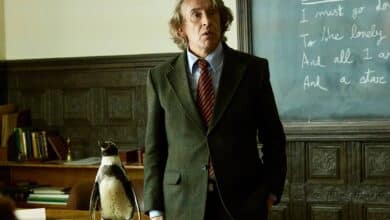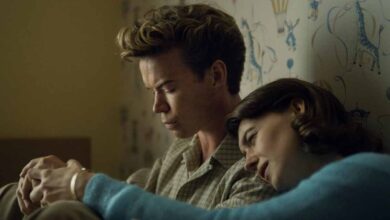Review: Up On the Glass
Up On the Glass (2020) is a psychological thriller, co-written by Nikki Brown and Kevin Del Principie, and directed by Kevin Del Principie. As the film opens, we are introduced to Jack DiMercurio (Chase Fein). Jack, a hirsute young artist, sits in his truck outside of a house. He sits in his truck quietly making a sketch of the house. Suddenly, the automatic garage door begins to open, at which point, Jack fires up the truck and splits.
Jack’s silence continues as he drives to a store of some sort in a small town in Michigan. Inside the store Jack has an awkward interaction with two women who work there. Next thing you know, Jack is shaving off his beard, and then driving some more. Finally, Jack arrives at a beachfront house, belonging to his friend Andy Shelton (Hunter Cross). Jack and Andy talk about some stuff, and then Donald “Moze” Mosely arrives. Looks like it’s gonna be a best friends weekend!
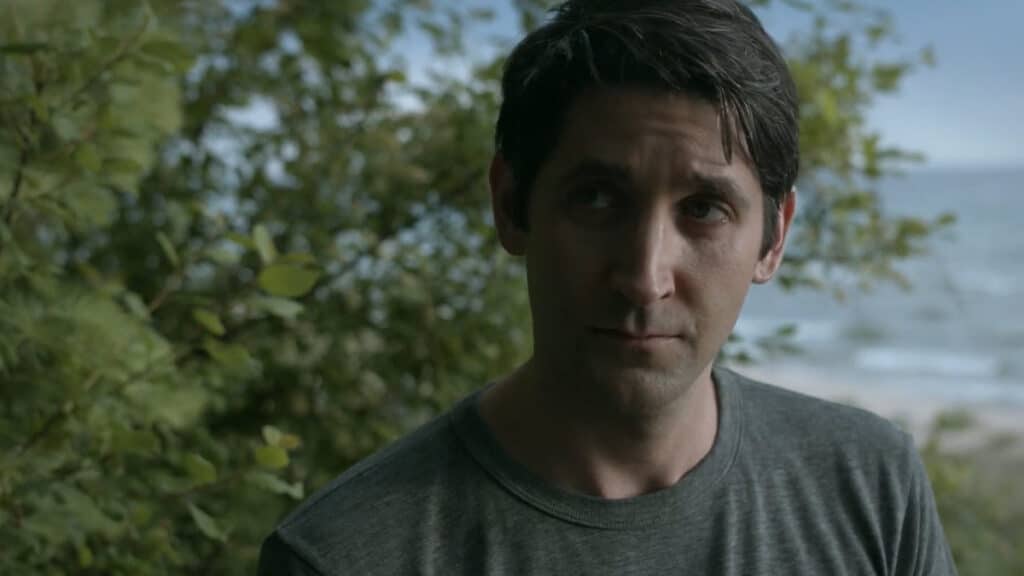
The best friends weekend continues, relatively uneventfully. They fish, they visit some dunes, they get drunk, they sublimate their homosexual angst by punching and pranking each other, and they talk a lot about some woman named Liz. Despite the fact that these guys are old friends, going all the way back to high school, there is a continuous, low-level hostility that informs all of the proceedings. Most of it comes from Andy and is directed at Jack and Moze. Truth be told, these guys don’t seem like very good friends after all.
Sunday rolls around and Moze has had enough. He leaves, never to be seen again. Meanwhile, for Jack and Andy, the best friends weekend continues unabated into the week. Jack and Andy travel to a local bar in the middle of the afternoon, where they re-meet the two girls Jack had met previously at the general store. They go back to Andy’s place. While Andy (who is married to Liz) and Becca (Jessica Lynn Parsons) fuck, Jack and Kate (Nikki Brown) hold hands into the night.
Following their libidinous escapades, the two girls leave, Jack and Andy spend their time on and around Andy’s house. The low-level hostility thing continues, the two talk a lot, Liz is mentioned a lot, and the animosity between the two seems to grow. This animosity culminates in a punch-out on the beach, during which Jack splits Andy’s head open with a rogue piece of firewood.
What is Jack going to do? Is Andy really dead? Will Liz ever be a character that actually appears in the film? Or will she just continue to exist in mane only? All these questions, and more will be answered, in the thrilling conclusion of Up On the Glass.
Only problem is, by the time these questions get answered, you won’t care. And even if you did still care by some miraculous stretch of the imagination, you will be disappointed with the answers. And it is anything but thrilling.
When writing reviews, I try to be as generous as I can without being dishonest. I always try to look for the silver lining. I’m the type of guy that believes in a silver lining. I mean, what else can one do with tragedy, disappointment, or any other type of shitty situation? You’ve got to look for that silver lining to try and maintain some sort of emotional equilibrium, when it seems like your ship is sinking. When something bad happens, I always try to ascertain what the upshot might be.
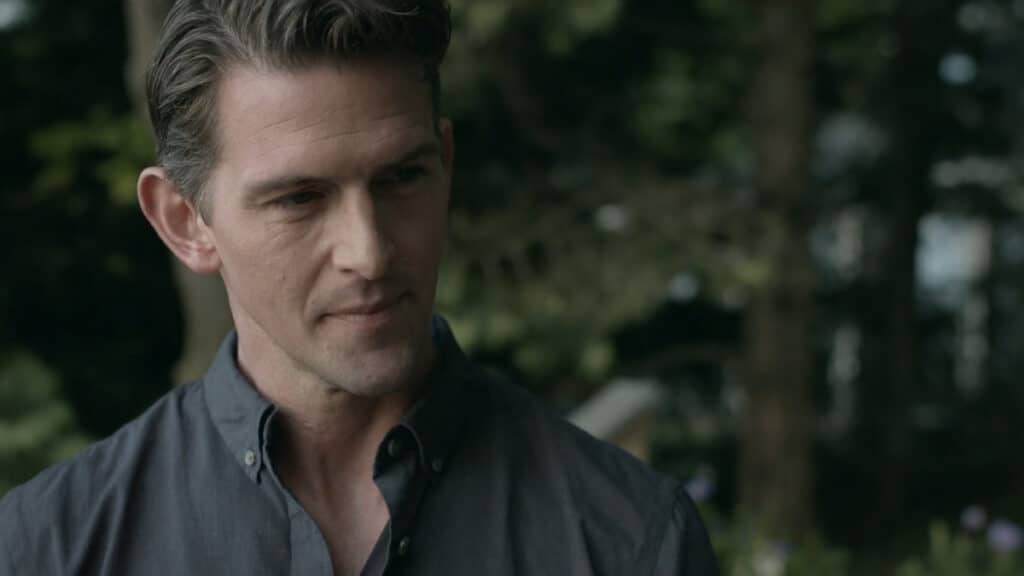
Up On the Glass is the first film I have encountered in my tenure with Review Nation that offers absolutely no silver lining whatsoever. There is virtually nothing right with this film. Actually, while I was not blown away by it, the cinematography by Mark Blaszak was perfectly acceptable. All of the shots looked fine, and the littoral Michigan locations looked as beautiful as I’m sure they do when consumed by the naked eye. But that’s about it. The rest of the film is as boring as it is pointless.
I was never sure if we were supposed to be on Jack’s side throughout this ordeal or not. If we were, the filmmakers failed, and if we weren’t, then what the fuck was the Goddamn point? Because we sure as Hell were given no reason to root for Andy. About the only character that evokes any emotion whatsoever is Moze, and that’s only because Andy is such a jerk to him the entire time for no apparent reason, that you feel a little bad for him. Which is funny because the character of Moze, and indeed the entire first half of the film are a complete waste of time. You could excise the entire first act of the film, and it would not suffer one iota.
And don’t believe for a second, as I’m sure the writers would insist, that the first 35 minutes includes crucial character development, and plot advancement. They’re lying. The first 35 minutes include none of that stuff. The characters are completely doucheworthy from start to finish, with no variation or growth in any direction. And before you ask, the answer is no, making your characters inconsistent does not count as growth or depth. These characters are firmly established within the first couple minutes of them jerking each other off on the beach. We didn’t need the other 30.
The film does this thing that I see too frequently, where the writers think they are being coy and clever by not revealing important plot details at first. As if this is going to create an aura of mystery for the viewer, their curiosity drawing them into the film as they thirst for answers. Well, that trick works sometimes, and fails sometimes. Up On the Glass failed hard. For 35 minutes, three boring characters say boring, pointless things to each other, being dicks to each other for no apparent reason, and NOTHING FUCKING HAPPENS. It was incredibly frustrating.
I’m not saying this because I’m looking for Jack and Andy to do battle with a giant squid or something like that. What I AM looking for is a genuine character arc, for the film to make a statement about something and then prove or disprove it through whatever happens to its characters. When I’m fed an ostentatious line about how rare finding glass on a sand dune is, I expect that to come back around by the end in some capacity. By the time Up On the Glass ends however, you too will be asking yourself why you watched it. The only good thing about the conclusion of the film is that it didn’t take longer to arrive. The ending is as baffling and completely unrealistic. The ending is totally stupid.
Typically when faced with a film that is more challenging to love, I will find that the actors still deserved praise. Like, okay if there are issues with the story or the production values, that sucks. But the silver lining is usually the performances. Sadly, none of the performances in Up On the Glass were even the slightest bit convincing. Liz (Chelsea Kurtz), when she finally shows up, is utterly one-note, and vacant. She warrants absolutely no warmth or sympathy whatsoever.
Chase Fein spends the film looking like Donnie Darko on Thorazine, offering a performance to match. He often seems to have difficulty speaking, instead opting for long, blank stares. He seems emotionally paralyzed, suffering from an inability to express rage, or joy. This utterly neuters any ability the character might have had to make the audience feel something for him. To paraphrase the great George Carlin, watching Jack DiMercurio is like watching flies fuck.
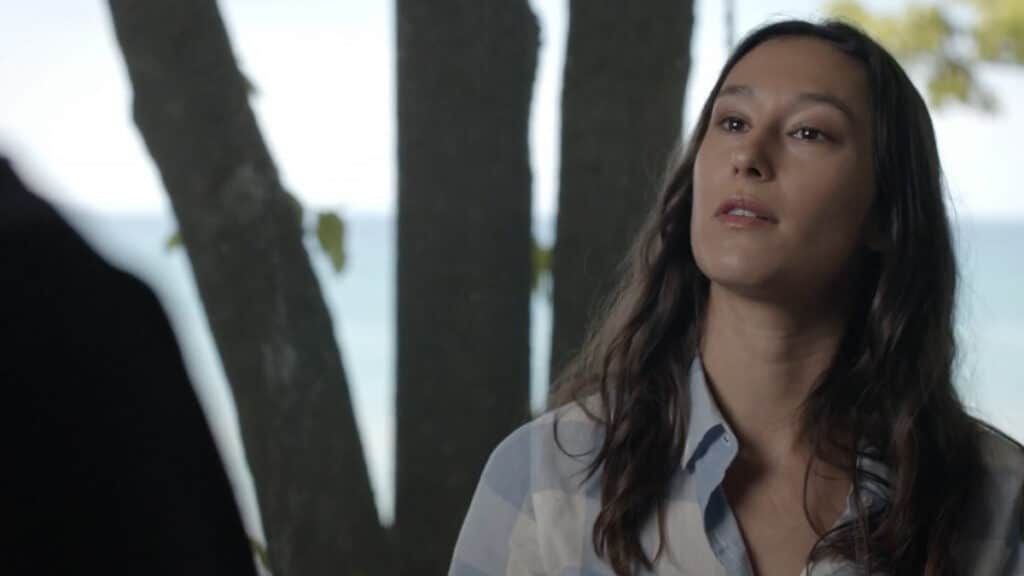
I should mention that I don’t fault the actors for this. When given a script this bad, what else are they supposed to do with it? I’ve seen Natalie Portman give amazing performances time after time. So what gives with Star Wars: The Phantom Menace (George Lucas, 1999)? Bad script, bad directing, that’s what. Up On the Glass is Del Principie’s debut at the helm of a feature length film, and it shows.
It should also be noted (again) that Del Principie co-wrote this film, which reminds me of a story I once heard William Shatner tell. He was appearing at a Star Trek convention, and a woman came up to the mic to ask him a question.
“I don’t know why you catch so much Hell for Star Trek V (William Shatner, 1989)” she said. “The script was bad, but you were the director. I don’t think people should be upset with you for Star Trek V being so bad. People should blame the writer” she insisted.
“But Ma’am” Shatner calmly replied. “I also wrote it.”
I’d like to wrap things up before I start beating a dead horse (as if I’m not already doing that). However, it is films like this that make me think that film school is the biggest scam of any college major out there. This film was written by a guy who used to teach screenwriting at Loyola Marymount, and a woman who has an MFA in screenwriting from USC. You have got to be fucking kidding me. THIS is the script we get from two people with THOSE CREDENTIALS?! I don’t know who was blowing enough smoke up the asses of these two that they thought this thing was worth spending other people’s money on, but there should be some kind of criminal charges involved. Film school, I want my fucking money back.
To summarize, Up On the Glass is bad. It is slow, pointless, a crushing bore. The performances are weak, and shallow. They are unconvincing at best, absolutely cringeworthy at worst. Just like the script, which is also bad. Be forewarned. Watch Up On the Glass if you dare, but don’t be surprised to find yourself furious at the end, and wishing there was some way Gravitas Ventures could refund you the 95 minutes you just wasted on this turd.
This is not a good film, and you shouldn’t reinforce this kind of bad decision making by offering it your patronage. There was one point at which both I, and the person I watched it with, turned to each other, and both said something that began with “hey, this is just like that part in The Room (Tommy Wiseau, 2003).” And there is absolutely no reason that anyone should ever say that about a film that they are supposed to take seriously. Unfortunately, unlike The Room, no one will find themselves laughing at this, intentionally or not.
Review
Rating
RN Review of Up On the Glass
This is not a good film, and you shouldn't reinforce this kind of bad decision making by offering it your patronage.

